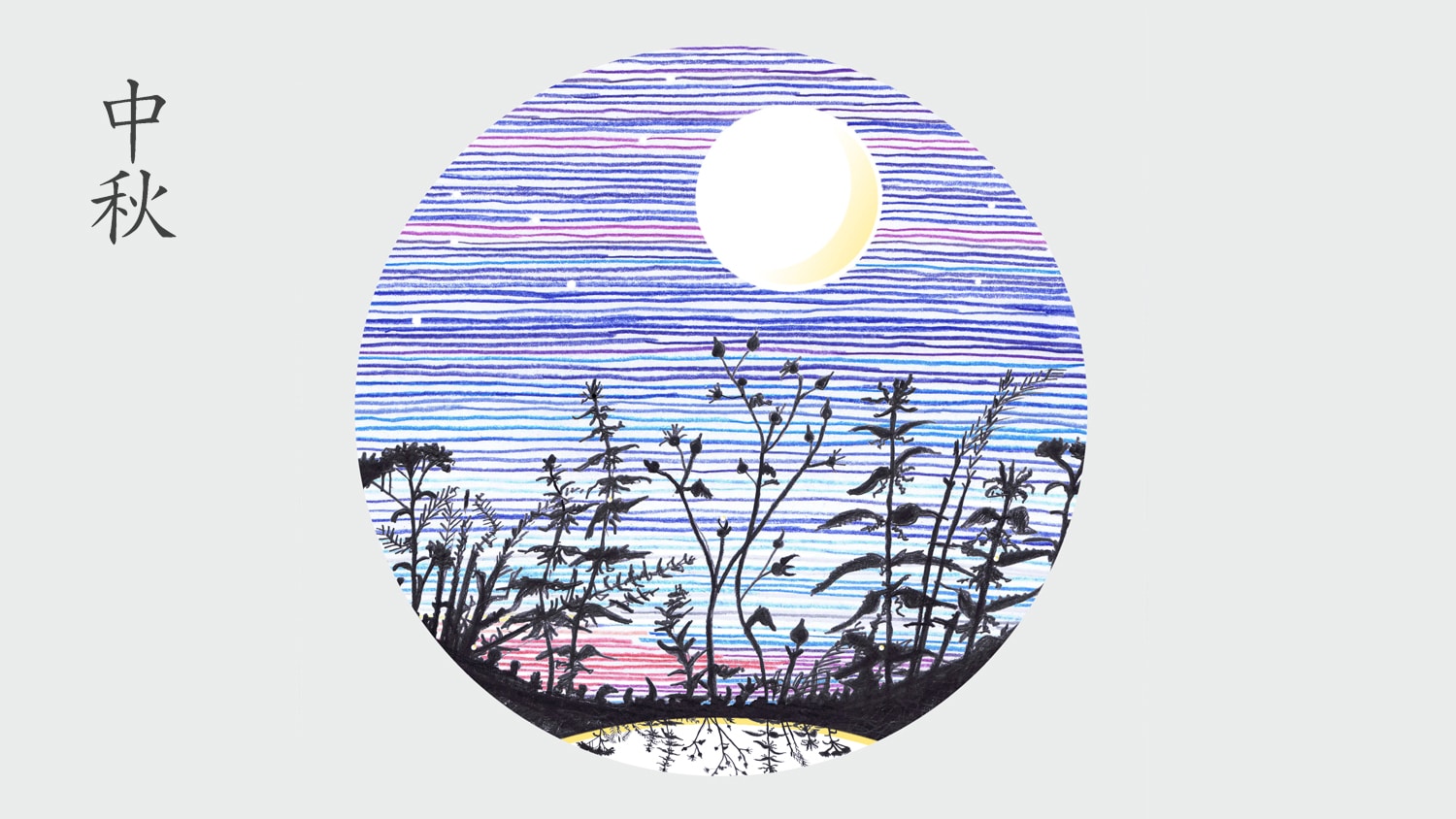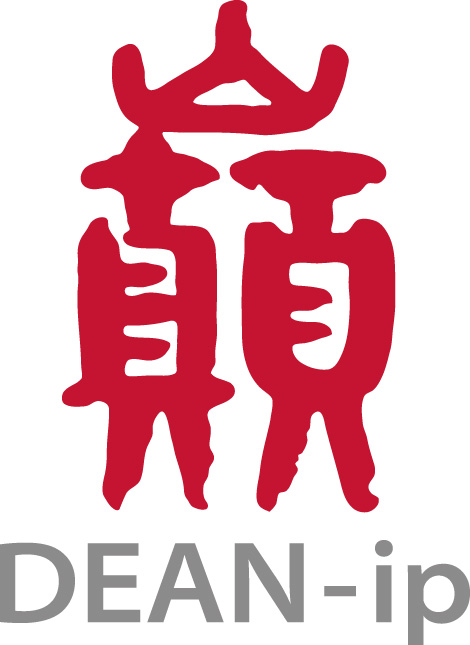Next DEAN-ip on 12th/13th September 2019
中秋 (Zhōngqiū) Moon Festival

Topic: Dream!
Zhōngqiū - Moon Festival
Normally for DEAN-ip we choose the times of the Solarterms. This time it’s different. Zhōngqiū, 中秋, also called the Mid-Autumn or Moon Festival, is one of the four traditional festivals in China. Although it does not belong to the 24 Solarterms, it has a very important meaning.
Zhōngqiū comes very close to the solarterm Bái Lù, „white dew“[1], in the atmosphere. At Bái Lù the temperature difference between day and night is greater than in summer, so that the humidity of the ground condenses to dew. At night it covers trees and grass as white dew. Dew is so important for our lives because it can arise when the sky is in harmony. Everything is then balanced, not too dry or too hot, not too damp and not too cool. It is just ideal for all plants.
At the Mid-Autumn Festival, autumn is more intense, the sky is clear, the moon is high. In China it is usual to enjoy the moon at Zhōngqiū and to connect symbolically through it.
Dream!
In their works, poets often describe the moon in mid-autumn as a symbol of reunification, perfection and sincerity. At Zhōngqiū the moon is beautiful, bright, full and round – in a perfect circular form. ‚Round‘ here means perfect and balanced. The atmosphere is ideal, very good and clear.
In China the poet Li Bai is well-known. In his poem „Thoughts in a silent night“ he describes the atmosphere:
„The bright moonlight in front of the bed appears like frost on the ground.
With my head raised I see the moon;
when I lower my head, I think of our homeland.“
The poet Su Shi also expresses his feelings:
„I hope that we will have a good and long connection,
even though we’re a thousand miles apart.
We can experience the same moon
and I can feel you.“
The poet Wang Wei writes about his longing for his homeland:
„At the Autumn Festival I think of my brothers in Shandong
Alone in a strange village.
I’m a stranger,
Whenever a feast approaches,
thoughts torture me of my loved ones
From afar I know: the brothers now
ascend to the mountain
For each one a place is set up
but one will be missing.“
Who lives completely alone in a foreign country, gets twice as much nostalgia on holidays. This festival reminds the poet to miss his hometown and the love of his family. Nowadays people often use this poem to express their feelings for their loved ones.[2]
Almost everyone in China knows these poems. The feeling is: We are facing the moon. We look at the moon and feel our family and our loved ones in our hearts. This is what these poems express: We are in different places, but we can experience and enjoy the same moon.
When we look down, we think of our home. ‚Home‘ corresponds to our prenatal, our inner being. Maybe someone is lonely, sits in the fields and the sky above him is so free… Above is only the moon. Moon festival. Okay, when he lowers his head down, all inner feelings come, the old stories. It’s like meditation.
„The moon festival is just so beautiful for this connection, the quantum entanglement.
The moon is like our hard drive.
Thousands of years ago people saw the same moon – as we do today.
We have connection to it again and again.
Our home – original root.“
Master Dean Li
The Zhōngqiū festival shows us what we can do during this time. Why is the moon so bright? Why do we want to celebrate the Moon Festival? Now the sky is especially clear. So of course we can connect better. Zhōngqiū gives us the opportunity to create a multitude of wonderful connections. Combined with this energy a dream can come true. Because the atmosphere and the Qi are clear and perfect – like a perfect circle.
Yuánmǎn, 圆满, that means completion, perfect, round. Things are perfect and very beautiful in this moment, there are no shortcomings or imbalances. In order to lead something to this completeness, for example to make dreams or tasks „round“, we need information and energy. That means healing. If dreams are „round“, then they are full – just like the full moon. A perfect circle. Harmony.
Entanglement
To feel deeply in the heart means to connect. At this feast many people look at the moon. When we do this, we immediately look into our inner being. The feeling, the old stories, such as topics of the family, rise up in us.
By the clarity of the sky, in its effect comparable to a free internet connection, all could connect. This is the quantum entanglement. The Moon Festival has so much to do with love. There are Chinese legends that tell about it:
嫦娥奔月: In the legend of Chang’e – the Chinese moon goddess – the relationship of Chang’e to archer Hou Yi and the search for an elixir of immortality is told. In the end, Chang’e lived on the moon. Hou Yi visited her every year at the Moon Festival. The two represent the Yin and Yang, the female and male principles. [3]
牛狼织女故事: Another legend tells about two lovers, a shepherd boy (牛郎, niúláng) and a weaver girl (織女, zhīnǚ), two stars separated in the sky by the Milky Way (Altair and Vega), who can be together once a year for one night.[4]
If one wants to understand the meaning of these parables more deeply, one can find explanations in quantum physics. How else can it happen that a woman and a man meet in this way and for what reason would they meet? Of course, they meet for the quantum entanglement, the qi connection. Energies come together and exchange – just like in DEAN-ip. Germany and China connect and try to come together in harmony. For each individual this changes something. It changes our destiny.
There is an individual destiny for each person, ‚Ming‘. Fortunately we find the ‚Dao‘. The Dao is for everyone. My Dao and your Dao are the same. The Dao is for me and for you. If we find Dao, it doesn’t matter what your ‚Ming‘ is. When our Dao is together, then we find a point, a possibility, what we can do together. Just like at Zhōngqiū. We all see the same moon, Chinese and German. Regardless of time and space, no matter how old, we always see the same moon. That is so important for us. We all see it together.
- [1]Bái Lù takes place on 7. - 8. September.↩
- [2]This poem by Wang Wei refers to the „Chongyang Festival“ (Double Ninth Festival). This is a traditional Chinese festival that is celebrated on the 9th day of the 9th lunar month. In Chinese numerology, nine is the quintessence of the Yang number. At the Chongyang Festival both day and month are assigned to Yang characters.
The tradition is to climb a mountain together with the family on this day, to enjoy the autumn sky and the clarity of the heights. Climbing mountains also stands for „climbing into a higher position“ - and thus symbolizes the increase of health, happiness and prosperity in one's own life.
The poet Wang Wei refers to this festival in his poem. He describes his longing, which he feels when the Chongyang Festival approaches - and he cannot climb the mountain traditionally with his brothers and family. Such holidays are often associated with many beautiful memories of the hometown. The brothers who climb the mountain together will also be sad and affected if the brother is not there that day. So they are not completely reunited.↩ - [3]Chang´e: Example for watching (YouTube) / Example to read (Wikipedia)↩
- [4]Cowherd and weaver: Example for watching (YouTube) / Example to read (Wikipedia)↩
